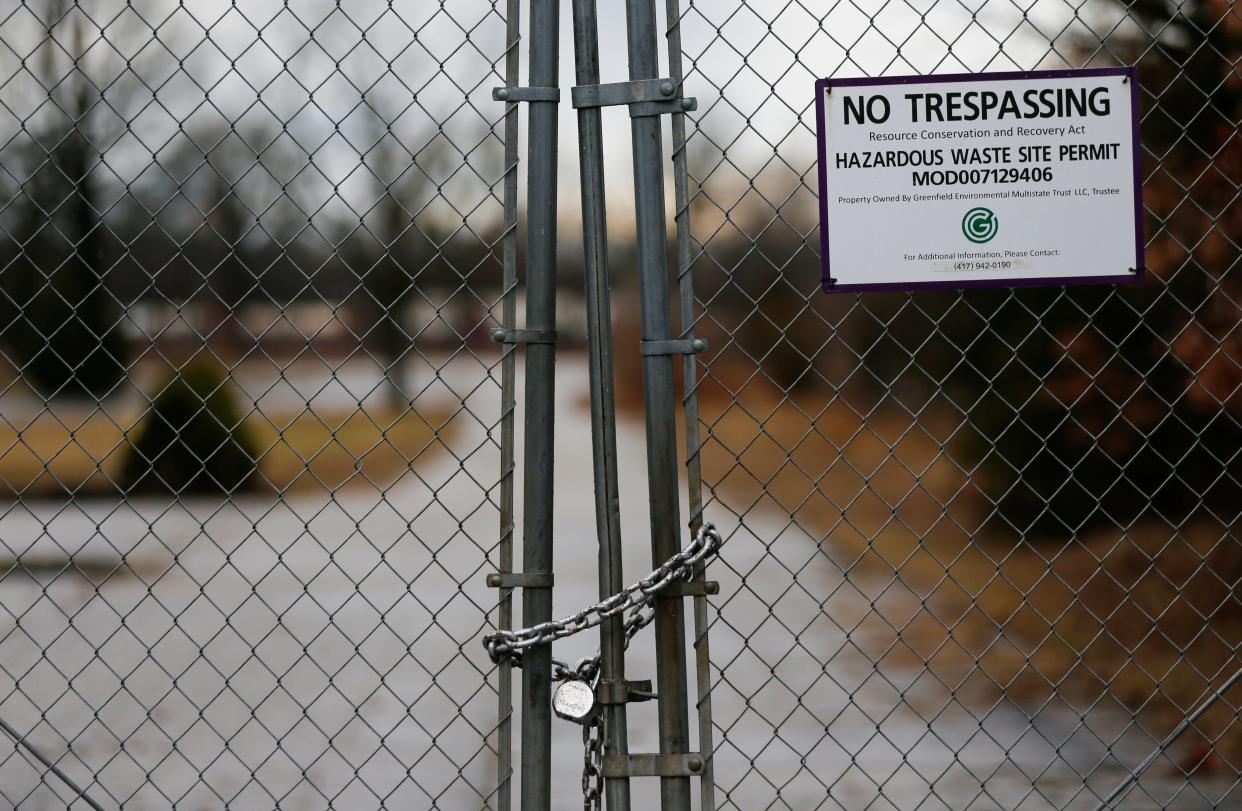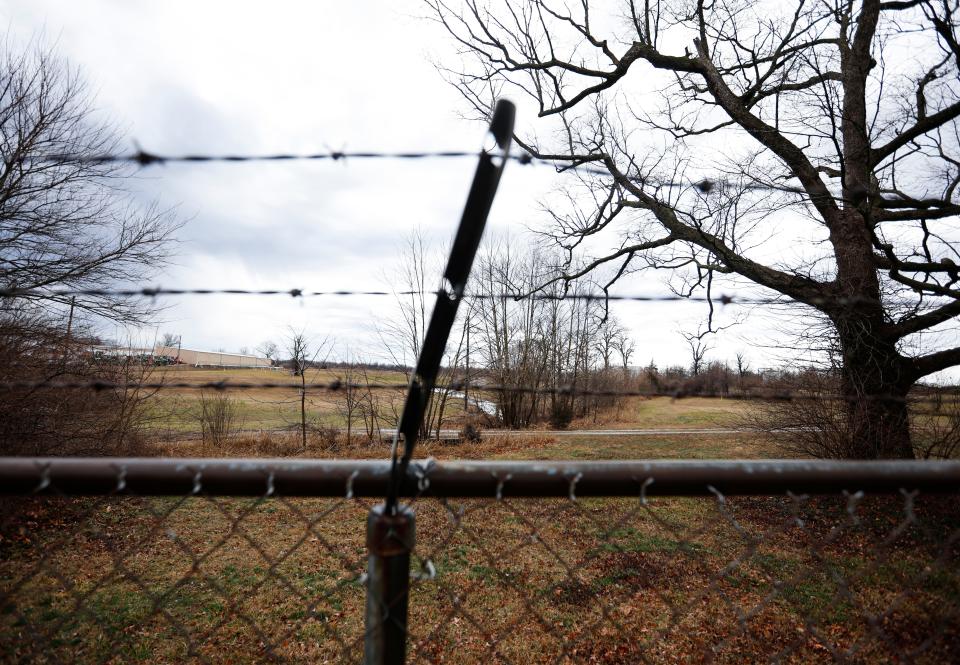Funding becomes a concern as expensive cleanup continues at contaminated Springfield site

A standing-room-only crowd filled the west-side event space Wednesday at the American Legion Post 676's Foxhole Bar and Grill.
The Multistate Environmental Response Trust — the group responsible for cleaning up the contaminated site of the old Kerr-McGee railroad tie plant on West High Street — held its first public meeting since 2018, and northwest Springfield residents came armed with questions about black soil, pungent odors, family illnesses and property values.
Among the most revealing parts of the meeting came toward the end when Multistate Trust Program Director Tasha Lewis was frank with the crowd, telling them the cleanup effort is expensive and they're concerned about how long their funding will last.
Here's how Wednesday's presentation broke down the funding issues:
Through court settlements and other avenues, the Multistate Trust acquired roughly $24.7 million to clean up the site, which was contaminated with creosote — a wood preservative that the EPA has determined to be a probable human carcinogen.
To date, the presentation said the Multistate Trust has about $14 million remaining.
Lewis said, however, the annual cost of the cleanup operation — which includes pumping and treating groundwater — is $750,000 a year, and getting increasingly expensive.
Lewis said if the property isn't sold and the Multistate Trust maintains control for the long haul, they will need to explore other funding options with state and federal partners.
"We will need to have conversations about what to do when the funds run out," Lewis said.
Discussion of groundwater issues dominates meeting
Lewis was joined at Wednesday's meeting by representatives from the Missouri Department of Natural Resources and Environmental Works, a company contracted to help with the cleanup effort.
A major focus of the meeting was on possible contamination of the groundwater caused by the creosote operations, which happened on the property at 2800 W. High St. from 1907 to 2004.
As Lewis explained, Kerr-McGee would discharge processed waste water into three lagoons on the east side of the property. Since creosote is heavier than water, the tar-like substance would sink below the surface, eventually impacting the groundwater.
Lewis said the karst topography below the surface makes it difficult to determine exactly where the contaminated groundwater from the old site ended up. But one area of particular concern for the Multistate Trust is a basin near the Golden Hills Subdivision, a half-mile north of the facility, where creosote-impacted water appears to have been discharging.
More:Group may test air in homes near contaminated Springfield site
Karen Hester has lived near Golden Hills Detention Basin for 20 years. She said she has experienced many of the issues that others discussed at the meeting like black soil in her neighborhood and creosote smells so intense they give her headaches at times.
"We can't grow gardens or anything, flower beds," Hester said.
Hester said her family hasn't experienced any serious health issues they would attribute to creosote contamination.
Lewis, who led Wednesday's meeting, also mentioned concerns over the years about creosote impacting the city of Springfield's public water supply, saying the Multistate Trust had worked with the city on replacing some pipes after potential issues were discovered.
People who attended the meeting were provided copies of the City Utilities 2021 Water Quality report, which showed that the city's water was in compliance when tested for various potentially harmful chemicals.
Lewis said the Multistate Trust is also regularly monitoring water quality with more than 30 groundwater wells installed throughout the area.

What's next for the cleanup operation?
John Durden has lived across the street from the old Kerr-McGee facility on Aline Avenue for 33 years. He said he attended Wednesday's meeting to learn more about future plans for the land once it's considered remediated.
And while there weren't many answers provided about who might buy the land or what it might someday be used for, Durden said he did find some of the information valuable about cleanup efforts and water monitoring.
"Where we live, I don't think we've had any trouble," Durden said.
Lewis outlined some plans for the future, including more soil and water testing, replacing some sewer laterals that connect people's homes to the main line, and eventually turning the Golden Hills Detention Basin into a usable wetland area.
Lewis also confirmed the group had considered planting more trees at the Kerr-McGee facility grounds to take advantage of a process called phytoremediation, where tree roots soak out contamination from the water table deep below the surface.
Resources
Representatives with the Multistate Trust encouraged residents to reach out with feedback, concerns, input or requests to have their soil tested. Lewis can be reached at TL@g-etg.com or 602-312-6993.
Abby Sawyer, with the Missouri Department of Natural Resources, can be contacted at Abby.Sawyer@dnr.mo.gov or 573-526-5397.
For personal injury or property damage claims, the Tronox Tort Claims Trust can be reached at 800-753-2480 or tronoxtorttrust@epiqglobal.com.
For concerns about illness caused by contamination, contact the Missouri Department of Health and Senior Services at 573-522-2806 or 866-726-9926.

Background
The Springfield plant began operating in 1907 as American Creosote Co. and was purchased by Kerr-McGee Chemical Corp. In 1965, an estimated 900,000 railroad ties a year were treated with creosote at the plant, which closed and was decommissioned in 2004.
Stories in the News-Leader's archives mention the "creosote-laden soil and sludge" left behind on the property, as well as reports of creosote leaks that contaminated a nearby spring and disrupted operations at the city's Northwest Sewage Treatment Plant.
Not long after the closure of the Springfield facility, Kerr-McGee spun off some of its operations — as well as the responsibility of paying for most of its accumulated environmental damages — into a separate company, called Tronox. Tronox filed for bankruptcy in 2009, while Kerr-McGee's more profitable assets were sold to a third company, Anadarko.
Investors and federal authorities cried foul, however, and took legal action to force Andarko to help pay for the cleanup of thousands of sites that had been contaminated by Kerr-McGee's operations. In addition to creosote contamination at wood-treating plants in the East, Midwest and South, the company polluted Lake Mead in Nevada with rocket fuel and left behind radioactive waste in Navajo Nation territory, according to the Associated Press.
This article originally appeared on Springfield News-Leader: Multistate Trust held public meeting for updates on Kerr-McGee efforts

